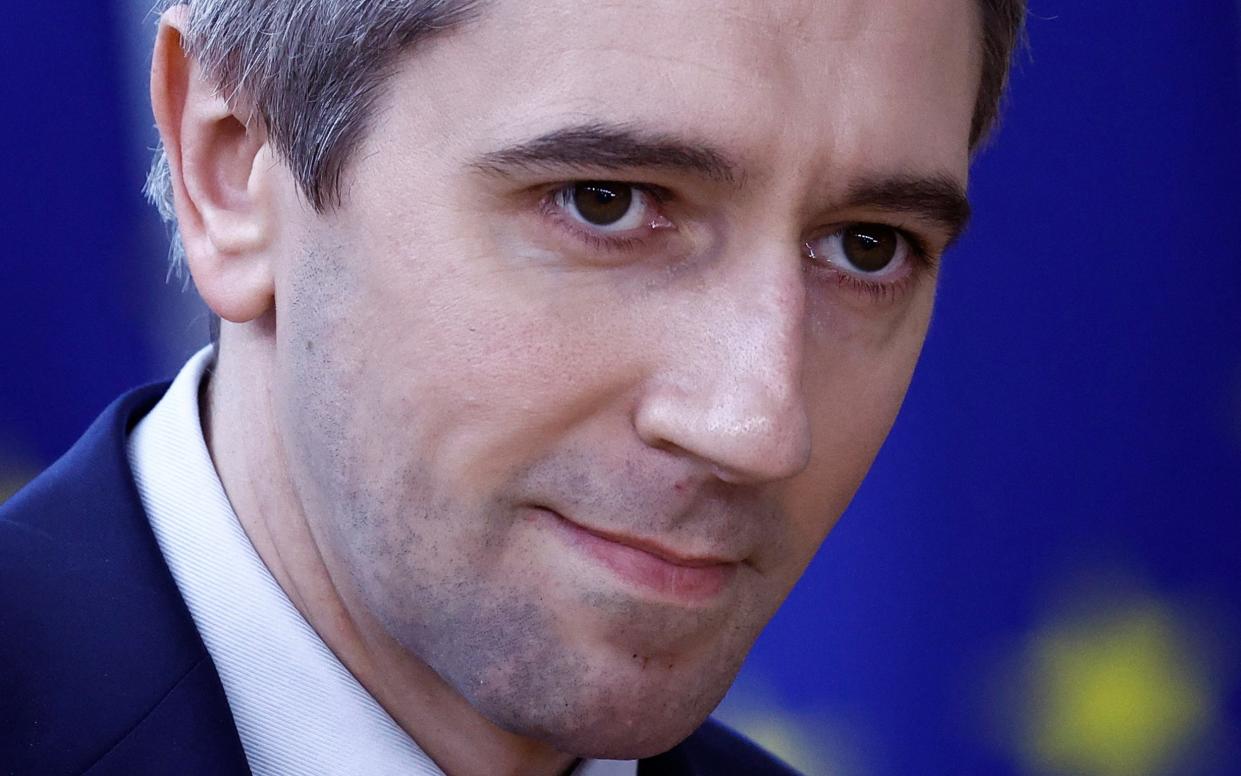Don’t send police to Irish border to stop migrants, Sunak tells Dublin

- Oops!Something went wrong.Please try again later.
Rishi Sunak has warned Dublin against sending extra police to the borders of Northern Ireland in an escalating row over asylum seekers crossing into the Republic from the UK.
The Prime Minister said the Irish government could not indulge in “cherry-picking” elements of international agreements to avoid a hard border between North and South.
“The Secretary of State is seeking urgent clarification that there will be no disruption or police checkpoints at or near the border and I can confirm that the United Kingdom has no legal obligation to accept returns of illegal migrants from Ireland,” Mr Sunak told MPs.
“Now, it’s no surprise that our robust approach to illegal migration is providing a deterrent, but the answer is not sending police to villages in Donegal. It’s to work with us in partnership to strengthen our external borders all around the Common Travel Area that we share.”
He was responding to Carla Lockhart, a DUP MP who accused the Irish government of using “unsubstantiated, unfounded” data on the number of asylum seekers crossing into Ireland to justify the deployment of police.
Doubts have been cast over Irish ministers’ claims that up to 90 per cent of migrants claiming asylum in Dublin are arriving from the UK.
Irish ministers have used the data to demand the UK take back asylum seekers who have crossed the Irish Sea to Belfast before travelling to Dublin’s International Protection Office (IPO) in order to claim asylum. Some migrants have said they are using the route to evade deportation to Rwanda.
Irish police cleared a “shanty town” of asylum seekers living in tents outside the International Protection Office in Dublin on Wednesday morning.
The operation to dismantle the so-called “tent city” housing about 200 migrants in lower Mount Street began at 6.30am on Wednesday.
Simon Harris, the Taoiseach, told the Irish Parliament on Tuesday that the tents would be cleared and their inhabitants would not be allowed to return.
“We need to make sure that the laws of the land are applied and it is not allowed to happen again because we do not live in a country where makeshift shanty towns are allowed to just develop,” he said.
Mount Street was closed to traffic on Wednesday morning as police, council officials and coaches were used to move the asylum seekers.
The migrants were taken to two locations: the Citywest Hotel and Crooksling tented accommodation in Co Dublin.
The former is a sprawling four-star hotel located 12 miles south-west of Dublin that has housed Ukrainian migrants for the past two years.
Mr Sunak has ruled out accepting any returns from Ireland unless the EU agrees to take back migrants who have arrived in the UK by crossing the Channel.
Senior refugee officials, first-hand accounts of migrants and Telegraph research have cast doubt on the Irish claims that as many as 80 per cent of asylum seekers in Ireland are from the UK. The UK Prime Minister’s official spokesman has also said the Government “does not recognise the figure”.
Even Ireland’s deputy prime minister Micheál Martin has admitted the figure is “not statistical, it’s not a database or evidence base”.
The 80 per cent figure was raised by Helen McEntee, the justice minister, who also told the cabinet that it could be up to 91 per cent. The figure is based on evidence that far fewer asylum seekers are presenting themselves at ports and instead are turning up at the IPO in Dublin.
The Irish justice department claimed it was basing its analysis not just on the data, but also the “experience of staff and others working in the field”, including interviews with migrants. As a result, its “firm assessment” was that more than 80 per cent of migrants had entered from Northern Ireland.
However, Nick Henderson, of the Irish Refugee Council, cast doubt on the analysis. “We don’t know how the department of justice came to the 80 per cent figure and, as far as we know, has not published its methodology,” he said.
“Just because a person has not applied for protection at an airport or port it does not automatically mean the person has crossed the border from Northern Ireland.”
“A person may pass through immigration control and then apply for protection at the IPO. They may not want to apply at the airport or port because they think they will be placed back on the flight and returned, putting them at risk of persecution.”
This tallies with on-the-ground research by The Telegraph where only half of the 20 migrants spoken to by this newspaper said they had travelled across the land border from Northern Ireland.
Some of the 10 who did not said they had flown directly to Dublin from their native countries or France and used a visitor visa or other visa to enter the country. They only claimed asylum after their arrival. Two migrants said they had entered illegally after crossing from France to Dublin on a fishing boat.
There are also questions over the validity of the Irish government’s evidence from asylum seekers. In a parliamentary reply last month, Ms McEntee said that when applicants filled in their forms they were asked about the route travelled to Ireland. But those records were “not stored in a manner which allows detailed data to be extracted,” she said.
Sources in Northern Ireland have played down the idea of large numbers of migrants crossing the border. No police resources have been recently diverted to deal with large and unexpected numbers of arrivals by boat and ferry.

